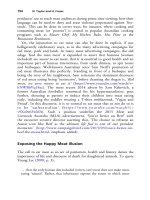The palgrave international handbook of a 223
Bạn đang xem bản rút gọn của tài liệu. Xem và tải ngay bản đầy đủ của tài liệu tại đây (27.18 KB, 1 trang )
218
A. Nurse
considerable attention has been paid to the topics of animal abuse and cruelty
and the study of animal abusers (Beirne 2007; Nurse 2013a; Sollund 2012).
Green criminology also provides a mechanism for rethinking the study of
criminal laws, ethics, crime and criminal behaviour (Lynch and Stretesky
2003; Situ and Emmons 2000). Much animal abuse discourse is concerned
with direct abuse in the form of physical cruelty caused to animals and the
links between domestic animal abuse, domestic violence and more ‘serious’
forms of offending such as serial killing (Linzey 2009). Collecting, however,
must be seen in the context of its harm or impact on animal populations and
species survival but also in respect of its links to anthropocentric notions of
nonhuman animals as property to be disposed of as humans see fit and whose
lives are inherently worth less than human lives. Animals generally do not
have legal personhood that would confer victim status (Kean 1998; Regan
2004; Wise 2000). Sollund (2008) identifies such discrepancy as speciesism,
reflecting the construction of animals as ‘others’ and which emphasises the
difference between humans and animals.
This chapter argues that various forms of collecting constitute animal abuse;
reflecting both anthropocentric notions of what constitutes crime, and ideological perceptions about the value of nonhuman animal life. One important
rationalisation provided by the Hobby Criminal (Nurse 2013a, 2011) is that
of their offences being ‘victimless’ crimes and thus, their activities should not
be the target of law enforcement activity. An example can be found in the case
of egg collector Richard Pearson, jailed in 2008 for possessing more than 7,000
eggs (Wood 2008) whose defence solicitor argued at court that:
It is of some significance that this defendant is not a dangerous man to the
public. He is simply a working man who had an overwhelming fascination for
eggs. In reality what he has been experiencing over the last months and years is
an unlawful habit. (Wood 2008)
Such denial of criminality; avoidance of responsibility and attempt to
minimise the severity of collecting offences as a ‘habit’ or ‘hobby’ is integral
to an offender’s rationalisation. While egg collecting and large-scale taxidermy possession cases are routinely prosecuted, in the UK at least, these
activities have limited negative impact on species’ populations. Yet in the
case of rarer species such as big game, illegal trophy hunting risks impacting
negatively on carefully constructed conservation plans and can risk species
survival. Hobby criminals, particularly collectors, do not readily accept that
their activities amount to criminal behaviour and use techniques of avoidance, denial, displacement of blame and challenges to the legitimacy of









